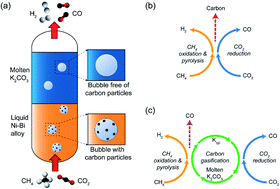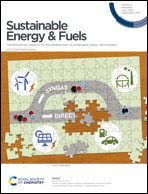Methane dry reforming in a coking- and sintering-free liquid alloy-salt catalytic system†
Abstract
We present a liquid catalytic system comprising a liquid Ni–Bi alloy and a molten K2CO3 salt, which completely resolves the coking and sintering issues for dry reforming. The conversions of CH4 and CO2 reach 60% and 70%, respectively, in a 30 cm bubble column comprising 15 cm Ni0.27Bi0.73 and 15 cm K2CO3 at 1050 °C. The CO selectivity is near 100% throughout the temperature range of 950–1050 °C. A 120 hour stability test at 1000 °C shows no performance degradation, suggesting a stable and effective dry reforming process for syngas production. The catalytic performance and durability demonstrated highlight the potential of dry reforming for commercial applications.



 Please wait while we load your content...
Please wait while we load your content...